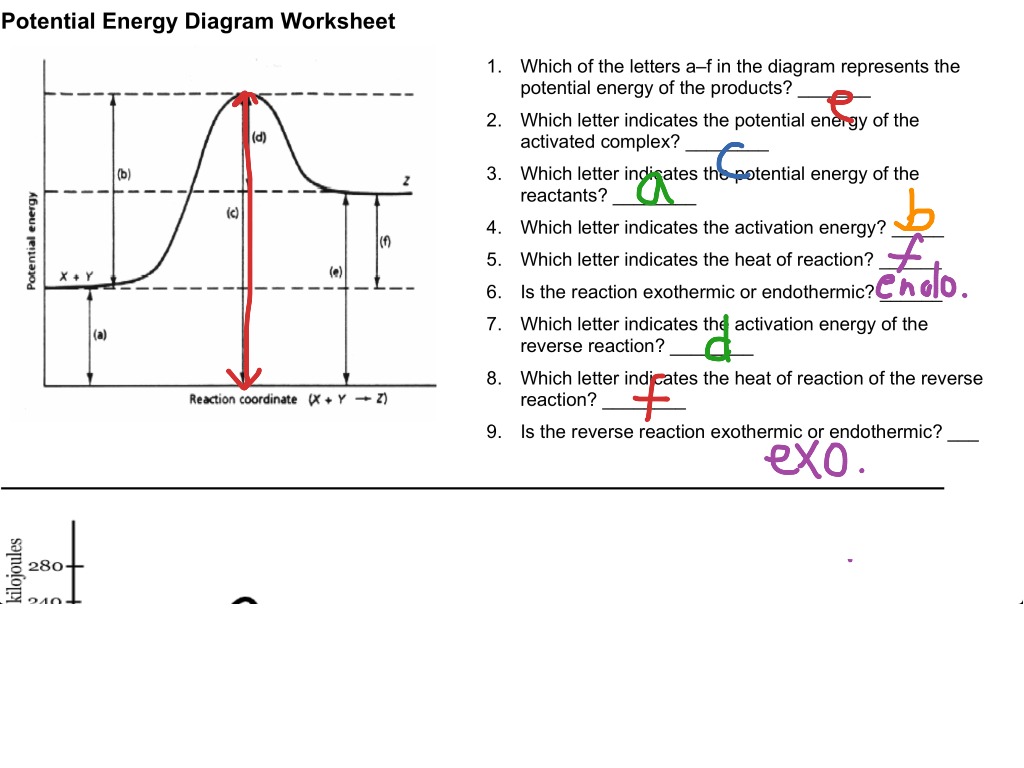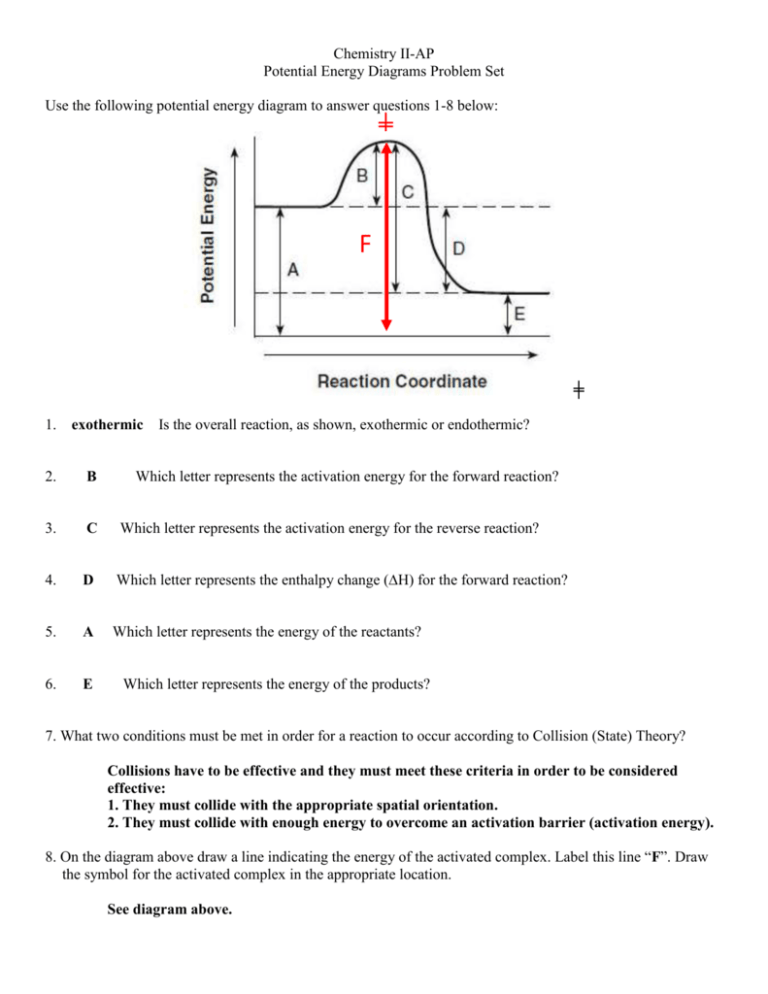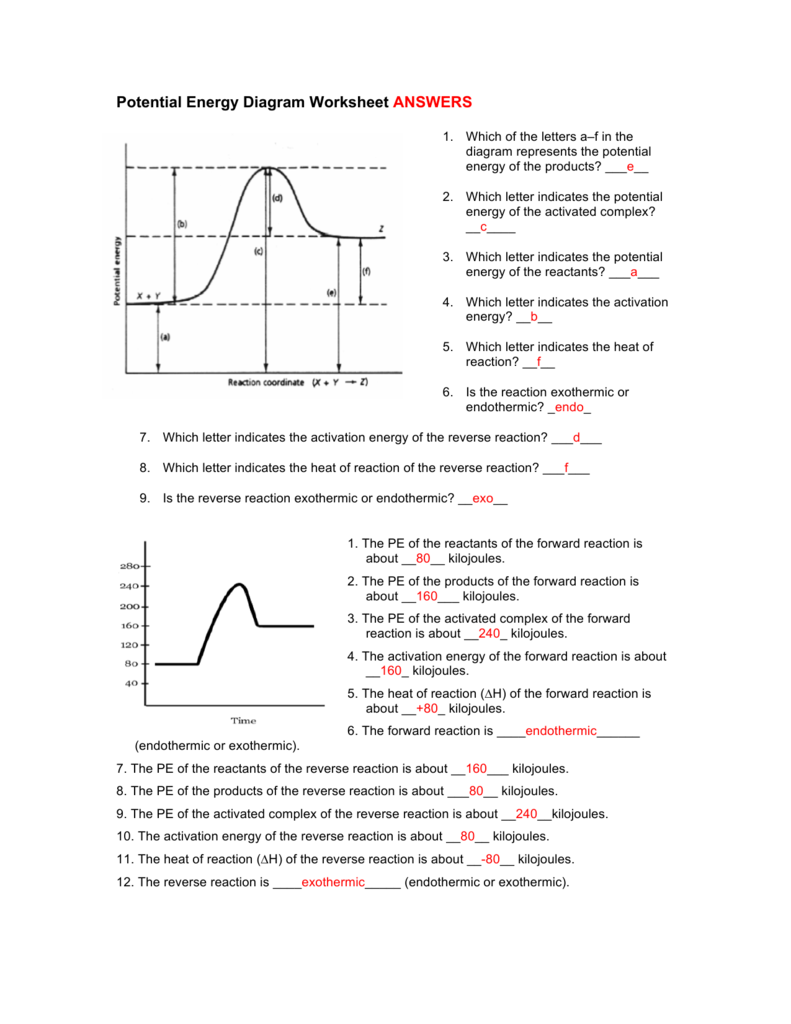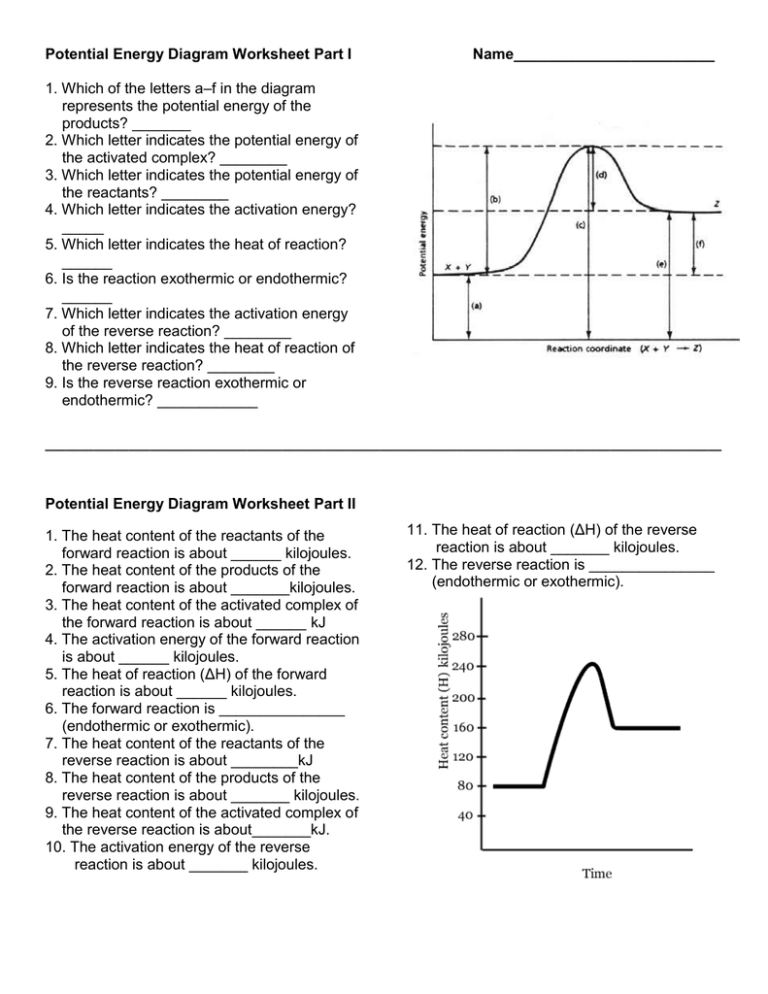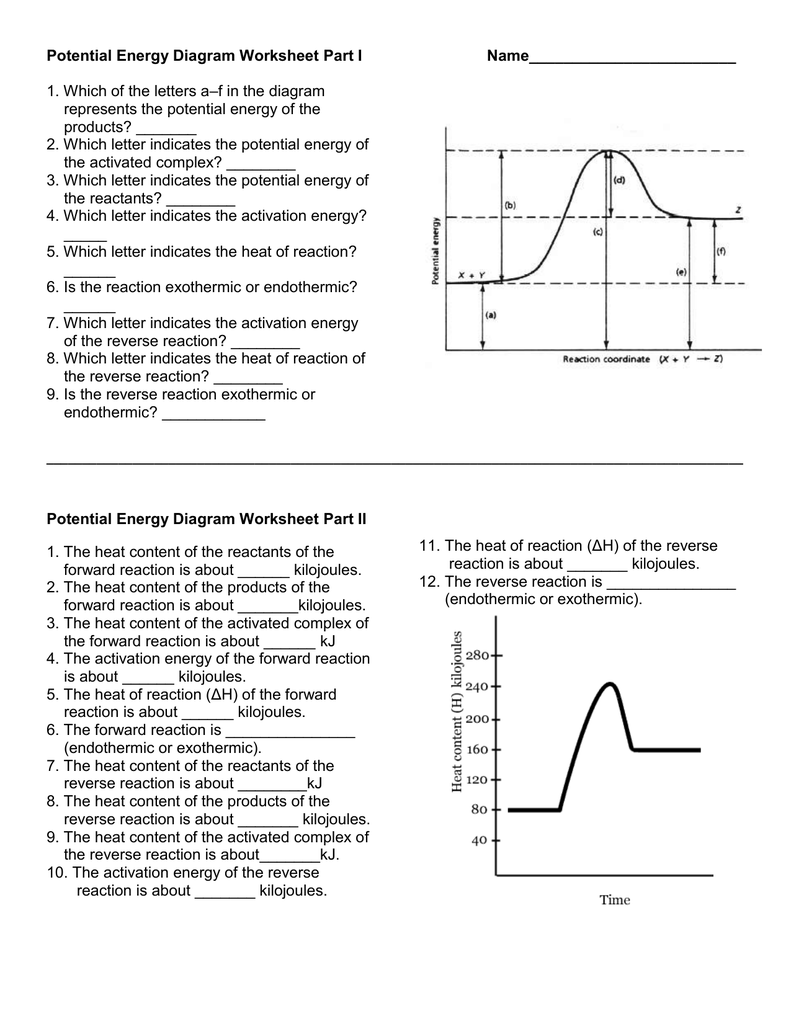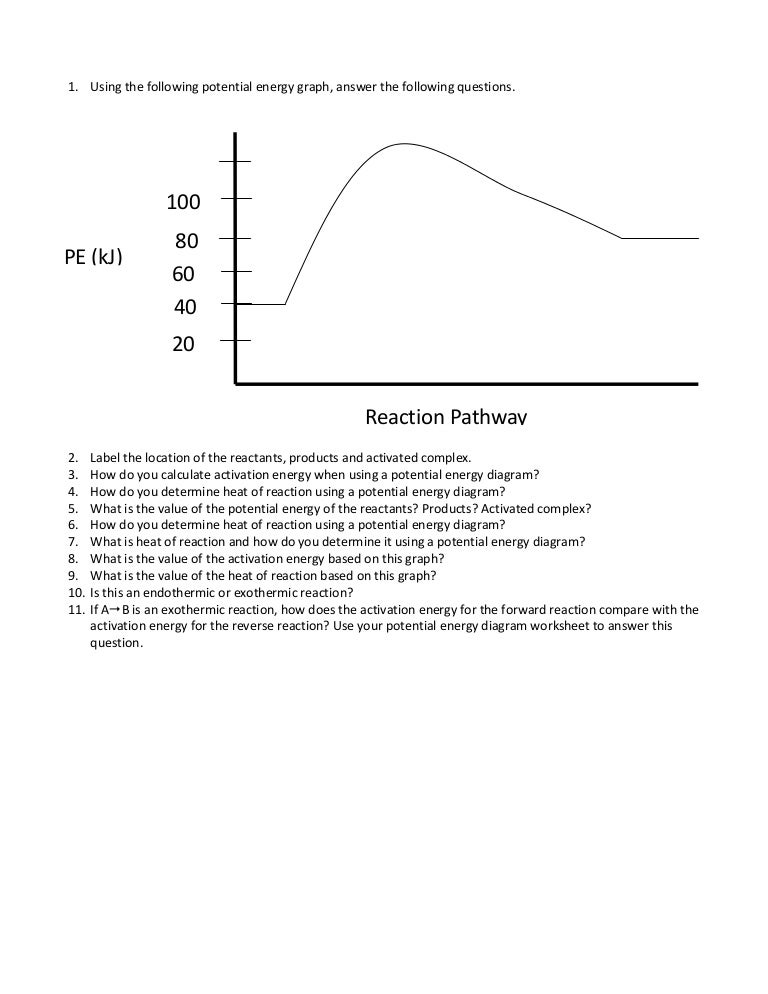Potential Energy Diagrams Worksheet - Ate of increasing the concentration of b? The potential energy (δh) of the reactants in the reverse reaction is about _____ kilojoules (kj). Draw the pe diagram showing the pe changes that occur during a successful collision of the. Burning coal (carbon) is a highly exothermic reaction. Practice plotting and analyzing potential energy diagrams for chemical reactions. Sketch a potential energy diagram for a general reaction a + b↔c + d. Draw a potential energy (e p ) diagram for a reaction in which ∆h = 80 kj/mol and e a = +28kj/mol. Ws # 4 potential energy diagrams worksheet 1. Complete three reactions and answer questions about enthalpy,. Label the axes, activation energy,.
Complete three reactions and answer questions about enthalpy,. What is the effect on. Label the axes, activation energy,. Burning coal (carbon) is a highly exothermic reaction. Ws # 4 potential energy diagrams worksheet 1. Overall rate of increasing the concentration of a? The potential energy (δh) of the reactants in the reverse reaction is about _____ kilojoules (kj). Draw a potential energy (e p ) diagram for a reaction in which ∆h = 80 kj/mol and e a = +28kj/mol. Practice plotting and analyzing potential energy diagrams for chemical reactions. However coal, in contact with air at room temperature.
The potential energy (δh) of the reactants in the reverse reaction is about _____ kilojoules (kj). However coal, in contact with air at room temperature. Draw a potential energy (e p ) diagram for a reaction in which ∆h = 80 kj/mol and e a = +28kj/mol. What is the effect on. The potential energy (δh) of the products in the. Burning coal (carbon) is a highly exothermic reaction. Overall rate of increasing the concentration of a? Label the axes, activation energy,. Draw the pe diagram showing the pe changes that occur during a successful collision of the. Complete three reactions and answer questions about enthalpy,.
Potential Energy Worksheet Printable Word Searches
Burning coal (carbon) is a highly exothermic reaction. However coal, in contact with air at room temperature. Ws # 4 potential energy diagrams worksheet 1. Overall rate of increasing the concentration of a? What is the effect on.
Potential Energy Diagram Worksheet Part Ii
The potential energy (δh) of the reactants in the reverse reaction is about _____ kilojoules (kj). Draw a potential energy (e p ) diagram for a reaction in which ∆h = 80 kj/mol and e a = +28kj/mol. Overall rate of increasing the concentration of a? Sketch a potential energy diagram for a general reaction a + b↔c + d..
Potential Energy Diagrams
Ate of increasing the concentration of b? Sketch a potential energy diagram for a general reaction a + b↔c + d. The potential energy (δh) of the reactants in the reverse reaction is about _____ kilojoules (kj). Practice plotting and analyzing potential energy diagrams for chemical reactions. Draw the pe diagram showing the pe changes that occur during a successful.
Potential Energy Diagram Worksheet ANSWERS
Sketch a potential energy diagram for a general reaction a + b↔c + d. However coal, in contact with air at room temperature. Burning coal (carbon) is a highly exothermic reaction. The potential energy (δh) of the reactants in the reverse reaction is about _____ kilojoules (kj). What is the effect on.
Potential Energy Diagram Worksheet Chemistry
Overall rate of increasing the concentration of a? Ws # 4 potential energy diagrams worksheet 1. Draw the pe diagram showing the pe changes that occur during a successful collision of the. Ate of increasing the concentration of b? Burning coal (carbon) is a highly exothermic reaction.
Potential Energy Diagrams Worksheets Samples
Label the axes, activation energy,. Ate of increasing the concentration of b? The potential energy (δh) of the products in the. Ws # 4 potential energy diagrams worksheet 1. Sketch a potential energy diagram for a general reaction a + b↔c + d.
Potential Energy Diagram Worksheet Part I
The potential energy (δh) of the reactants in the reverse reaction is about _____ kilojoules (kj). Burning coal (carbon) is a highly exothermic reaction. Label the axes, activation energy,. Ws # 4 potential energy diagrams worksheet 1. The potential energy (δh) of the products in the.
Potential energy diagram worksheet 1
Overall rate of increasing the concentration of a? Ws # 4 potential energy diagrams worksheet 1. The potential energy (δh) of the reactants in the reverse reaction is about _____ kilojoules (kj). Draw a potential energy (e p ) diagram for a reaction in which ∆h = 80 kj/mol and e a = +28kj/mol. Practice plotting and analyzing potential energy.
Energy Diagrams Chemistry
Ws # 4 potential energy diagrams worksheet 1. Burning coal (carbon) is a highly exothermic reaction. Draw a potential energy (e p ) diagram for a reaction in which ∆h = 80 kj/mol and e a = +28kj/mol. Sketch a potential energy diagram for a general reaction a + b↔c + d. Overall rate of increasing the concentration of a?
Potential Energy Diagrams Worksheet Answers
Ws # 4 potential energy diagrams worksheet 1. Sketch a potential energy diagram for a general reaction a + b↔c + d. What is the effect on. Burning coal (carbon) is a highly exothermic reaction. Practice plotting and analyzing potential energy diagrams for chemical reactions.
Sketch A Potential Energy Diagram For A General Reaction A + B↔C + D.
The potential energy (δh) of the reactants in the reverse reaction is about _____ kilojoules (kj). Burning coal (carbon) is a highly exothermic reaction. Draw the pe diagram showing the pe changes that occur during a successful collision of the. Overall rate of increasing the concentration of a?
What Is The Effect On.
The potential energy (δh) of the products in the. However coal, in contact with air at room temperature. Complete three reactions and answer questions about enthalpy,. Draw a potential energy (e p ) diagram for a reaction in which ∆h = 80 kj/mol and e a = +28kj/mol.
Ws # 4 Potential Energy Diagrams Worksheet 1.
Practice plotting and analyzing potential energy diagrams for chemical reactions. Label the axes, activation energy,. Ate of increasing the concentration of b?

